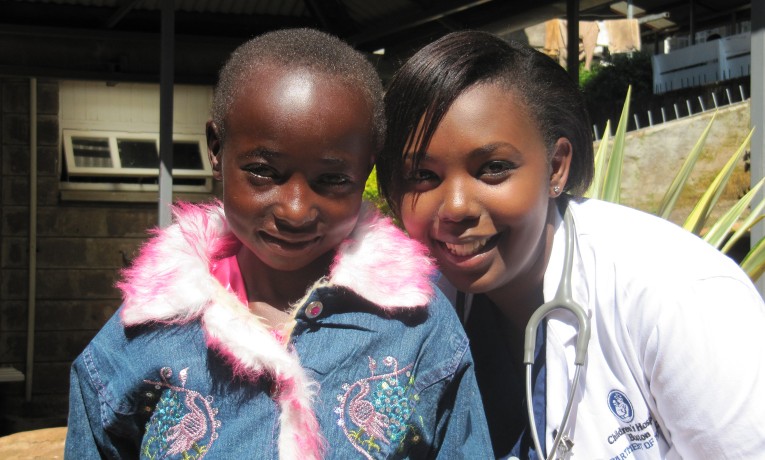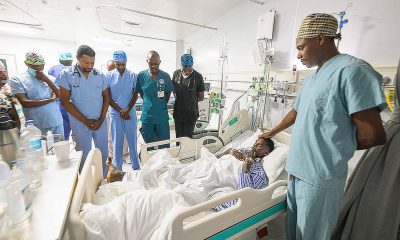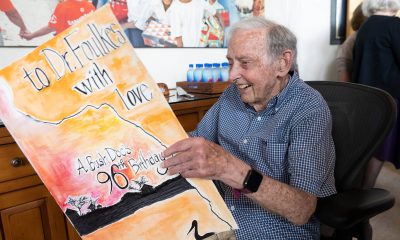A doctor who recently served at Tenwek Hospital in Kenya through World Medical Mission reflects on how the hospital has changed the lives of so many people.
By Carolyn Stickney, a pediatric critical care physician who has been making trips to Tenwek Hospital since before she was able to sign prescriptions.
I first met Chepkemoi during chaotic Saturday morning rounds on the pediatrics ward at Tenwek Hospital in Kenya.
Like a small handful of patients at any given time on the ward, she was HIV-positive, and her CD4 counts were low enough to make her susceptible to a number of opportunistic infections. She had been admitted through the clinic the evening before after having headaches and fevers, and her diagnosis, fungal meningitis, committed her to at least a two-week stay in the hospital.
After the weekend, one of the interns on the team, Mercy, assigned herself to follow Chepkemoi, seeing her every morning and presenting her case to the team.
There was no question those first few days that Chepkemoi felt miserable; she continued to report headaches and wasn’t eating particularly well. But after several days of therapy she began to improve, and Mercy’s reports on rounds became much more mundane.
One morning, however, Mercy was concerned. Chepkemoi had stopped eating again and wouldn’t meet her gaze.

Tenwek Hospital offers medical care in rural Kenya where otherwise most people wouldn’t have any access to medicine.
Mercy had thoughtfully considered a number of medical explanations. She seemed fairly stable, but something seemed amiss. So Mercy asked more questions and discovered that Chepkemoi’s parents, both HIV-positive as well, hadn’t yet told their daughter of her diagnosis in spite of several hospitalizations for complications of the disease. Mercy worried that Chepkemoi was becoming depressed by her chronic illness, particularly because she had no way of understanding it.
By pressing the rest of the team to help with this challenging problem, Mercy learned about resources at the hospital that would help her care for Chepkemoi’s spiritual and emotional needs as well as her physical ones. She enlisted the help of an HIV-positive staff member in the outpatient pediatrics department to help counsel the girl’s parents about how to speak to their daughter about her diagnosis and to minister to them as they dealt with the ongoing burdens of their own disease. She spent extra time with Chepkemoi, making certain she heard the Gospel.
A couple of days later, Chepkemoi was noticeably brighter, up and wandering around the hospital courtyard in the morning sun. Whether her improvement was due to Mercy’s interventions or to recovery from some transient physical setback I can’t say with certainty. However, I do know that when Chepkemoi’s mother returned to the hospital with a “smart” pink dress for her daughter, our patient put a halt to rounds by demanding to have a picture taken in her beautiful dress with the doctor who had cared so lovingly for her during her illness. In capturing that image, I felt that I had captured one of the reasons that serving at Tenwek is so important to me.
How Tenwek is Changing Lives
When I’m asked to reflect on my time at Tenwek Hospital, it’s an almost overwhelming proposition for how rich and challenging my experiences have been over the years. What I’ve loved most about being there – a sense of vocational coherence in being liberated to be a Christian physician – hasn’t changed since my first trip in 2004.
But as I’ve transitioned from student to resident to attending physician, I’ve come to have a deeper appreciation for Tenwek’s commitment not only to excellence in both physical and spiritual care but also to training the next generation of Christian healthcare providers in Kenya.

These graduating medical officer interns will take the knowledge they learned at Tenwek to hospitals throughout Kenya.
Tenwek is in rural western Kenya, where every year more than a dozen Kenyan interns sacrifice the comforts of city living to spend 12 months in the small town of Bomet. These young men and women work long hours and benefit from some of the best medical training available in their country.
But what makes Tenwek’s program truly special is the focus on spiritual care, personal maturation in faith, and development as a Christian healthcare provider. Daily morning report yields to group devotions once a week. Interns are mentored individually by long-term staff. On the pediatrics ward where I work, part of every child’s history is a spiritual inventory. Do they go to Sunday school? Do they know about Jesus?
The same morning in April that I met Chepkemoi, I had the privilege of attending the medical officer interns’ graduation. After their year at Tenwek is over, these individuals scatter to government postings across the country, where some serve as one of only a few doctors in a facility or may be the only Christians on staff. With their internships as foundations, though, they are equipped – wherever they go – to love their patients as Christ loves us and are well trained to provide for both physical and spiritual needs.
Having the opportunity through World Medical Mission to be even a small part of that foundation for interns like Mercy, who will leave Tenwek but take the light of Christ with them, is a humbling gift.






